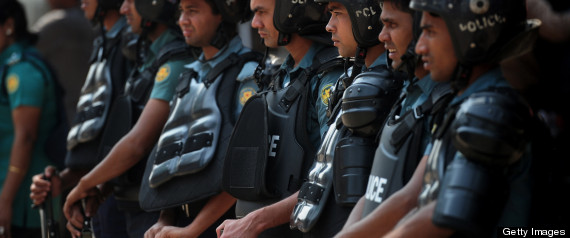Rubber bullets and tear gas have been used against thousands of protesters in Bangladesh, as crowds took to the streets calling for better working conditions after a factory collapsed killing at least 270 people.
As rescuers continued to search the rubble for survivors, police clashed with angry garment workers who want better safety standards in factories, many of whom export clothes to Western companies.
There are conflicting reports about exactly how many people have been pulled from the rubble since the eight storey building collapsed, but more than 40 are believed to have been rescued.
Hundreds are still missing, feared dead. Around 2,000 people were thought to have been working in the building at the time.
Bangladesh is the world's second leading garment exporter and the factory in Dhaka that collapsed on Wednesday supplied both Primark and Bonmarche.
Cracks in the building had been reported the day before the collapse but managers had forced workers to return. The owner has now fled, according to reports. However the Bangladesh Prime Minister said he would be found and brought to justice.
Across the country hundreds of thousands of workers walked out of their factories in solidarity with those who died when the building collapsed. According to Sky News, screams can still be heard through the concrete as workers remain trapped.
In a statement released on their website, a Primark spokesman said: "The company is shocked and deeply saddened by this appalling incident at Savar, near Dhaka, and expresses its condolences to all of those involved.
"Primark confirms that one of its suppliers occupied the second floor of the eight storey building, which housed several suppliers to the garment industry making clothing for a number of brands.
"Primark has been engaged for several years with NGOs and other retailers to review the Bangladeshi industry's approach to factory standards. Primark will push for this review to also include building integrity.
"Meanwhile Primark's ethical trade team is at this moment working to collect information, assess which communities the workers come from, and to provide support where possible."
Original Article
Source: huffingtonpost.co.uk
Author: Huffington Post UK
As rescuers continued to search the rubble for survivors, police clashed with angry garment workers who want better safety standards in factories, many of whom export clothes to Western companies.
There are conflicting reports about exactly how many people have been pulled from the rubble since the eight storey building collapsed, but more than 40 are believed to have been rescued.
Hundreds are still missing, feared dead. Around 2,000 people were thought to have been working in the building at the time.
Bangladesh is the world's second leading garment exporter and the factory in Dhaka that collapsed on Wednesday supplied both Primark and Bonmarche.
Cracks in the building had been reported the day before the collapse but managers had forced workers to return. The owner has now fled, according to reports. However the Bangladesh Prime Minister said he would be found and brought to justice.
Across the country hundreds of thousands of workers walked out of their factories in solidarity with those who died when the building collapsed. According to Sky News, screams can still be heard through the concrete as workers remain trapped.
In a statement released on their website, a Primark spokesman said: "The company is shocked and deeply saddened by this appalling incident at Savar, near Dhaka, and expresses its condolences to all of those involved.
"Primark confirms that one of its suppliers occupied the second floor of the eight storey building, which housed several suppliers to the garment industry making clothing for a number of brands.
"Primark has been engaged for several years with NGOs and other retailers to review the Bangladeshi industry's approach to factory standards. Primark will push for this review to also include building integrity.
"Meanwhile Primark's ethical trade team is at this moment working to collect information, assess which communities the workers come from, and to provide support where possible."
Original Article
Source: huffingtonpost.co.uk
Author: Huffington Post UK

No comments:
Post a Comment